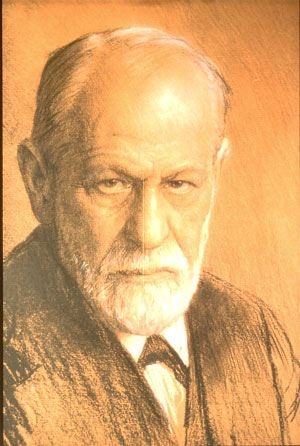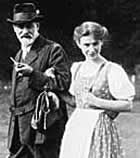 |
| Sigmund Freud (www.psiconet.orgfreudfotos.com) |
My hero is Sigmund Freud. I have always admired him because he was a remarkable man who came up with many brilliant ideas about people’s behavior. He was so intelligent and analytical.
He was born in Freiberg, Moravia on 6th of May 1856. His father was a businessman and his mother was the third wife.
Because his father married three times, Sigmund Freud had a large family; they were nine brothers and sisters. This included two step brothers, Emmanuel and Philip, whose age was near the age of Sigmund Freud’s mother! Sigmund Freud was younger than his nephew, John, Emmanuel’s child. The conditions, which were unusual, made Freud pay attention to it. This was the inspiration for his Oedipus Complex formulation. From childhood, Freud was loved by his mother until he got a lovely nickname “My Golden Sigi” (Sigi was taken from Sigismund). This mother’s love made Freud think, “If a child is loved by his mother, he will always be happy, until he becomes confident to become successful.” That was his reflection on who wanted to be successful.
Besides that, the anger of his father boosted up his desire to succeed. His father said that he would be nothing if he always wet his pants and his father’s bed. Actually, it made Freud sad. But that sadness did not encourage him. That action motivated him until he could say, “Can you look at me, what I am now?” (It means he had become a successful person.)
It is true, Freud’s dream had became reality. He was really a famous and successful person. Like an old woman fortune-teller had said before, “He would become a great man.” She had said this to Freud’s mother when Freud went to the shop with her.
Although Freud succeeded in psychology, he did not take psychology subject in university, but medical! This Jewish generation would always be a smart student in his medical study at University of Vienna at 1873.
At university, Freud specialized in neurology. He conducted extensive research at neurology under the supervision of Prof. Ernst Brucke, besides working in Theodor Meynert Clinic. During his studies, Freud met Dr. Josef Breuer. With Breuer, Freud always talked about his patient’s problem. One of his patients was Anna O, a young woman who suffered from hysteria (because of her father death). This is the symptom where a person could not drink even though she was thirsty , could not speak in the German language although it was her mother’s tongue, and coughed even though there was no physical cause.
Anna O was given hypnotism by Breuer so she could forget her traumatic experience. This way was called, “The talking Cure.” This way would influence Sigmund Freud’s theories. Then, Freud’s theories were influenced by Jean Martin Charcot, Freud’s teacher, the neurologist in Paris who was famous because of his studies on hysteria and hypnotism.
 |
| Sigmund Freud and Anna (www.fembio.orgimagesWF-anna-freud-sigmund.com) |
In 1886 Freud got married to Martha Bernays and they had six children. Many important theories came from Freud’s brain. And they were assisted by Wilhelm Fleiss (doctor from Berlin). Fleiss was a person who inspired Freud to like psychology subjects.
In 1900, Freud published the Interpretation of Dreams. This concept concluded that the dream was a human thought but in the subconscious mind. Or the desire to fulfill needs that had not been fulfilled all this time.
After that, The Psychopathology of Everyday Life. That 1901 masterpiece included the theory that forgetting or saying wrong things was not a momentary action. According to Freud, this was an unconscious action which had meaning.
Then also there was the Oedipus Complex, the concept by Freud which caused a commotion in 1905. According to Freud’s thought, sexual drive was the most energetic and motivating in human activity; a child also experiencing it, besides adults.
Because of that, he would chart the growth of the individual sexual stages through which one must pass, including the Oedipus Complex stage. What’s that? That was a stage iin which a boy (age 2-3 years) would be interested in his mother and feel jealous of his father, because he thought his father was his rival. A serious condition, Freud said, because if the boy lost this phase, he would suffer neurosis!
There are so many concepts and theories by this professor from the University of Vienna. All of them were called psychoanalysis, a term that was used by Freud since 1896. To strengthen and develop concepts and theories, Freud founded the Psychological “Wednesday Society,” which later became the Viennese Association of Psychoanalysis at 1908.
It was necessary that Freud founded this organization. In time, the members of this organization increased. This Psychoanalysis organization became so famous everywhere that it gained an international scale. The International Psychoanalytical Association (IPA) was made in 1910. It caught on with the publishing of psychoanalysis magazine.
But, in the middle of his glory, he had difficulties. Two members of his organization, Alfred Alder and Carl Jung, quit because did not agree with one of Freud’s theories. After they quit, they founded psychoanalysis alone.
Freud’s condition deteriorated. At 1923, he was diagnosed as suffering with cancer, because of too much smoking during the years. But Freud continued to develop concepts and theories although he passed through many operations.
Freud’s condition became more critical when NAZIs took over Austria. One year after his emigration to London, England, precisely on the 23th September of 1936, this father of psychology exhaled last breath. He passed away at 83 years old.
Page created on 5/14/2006 12:00:00 AM
Last edited 5/14/2006 12:00:00 AM
